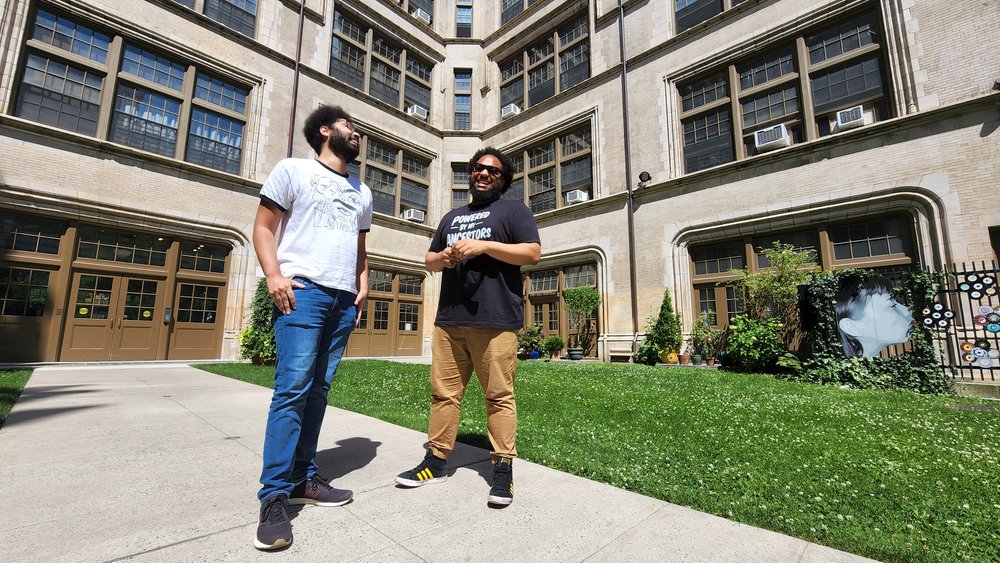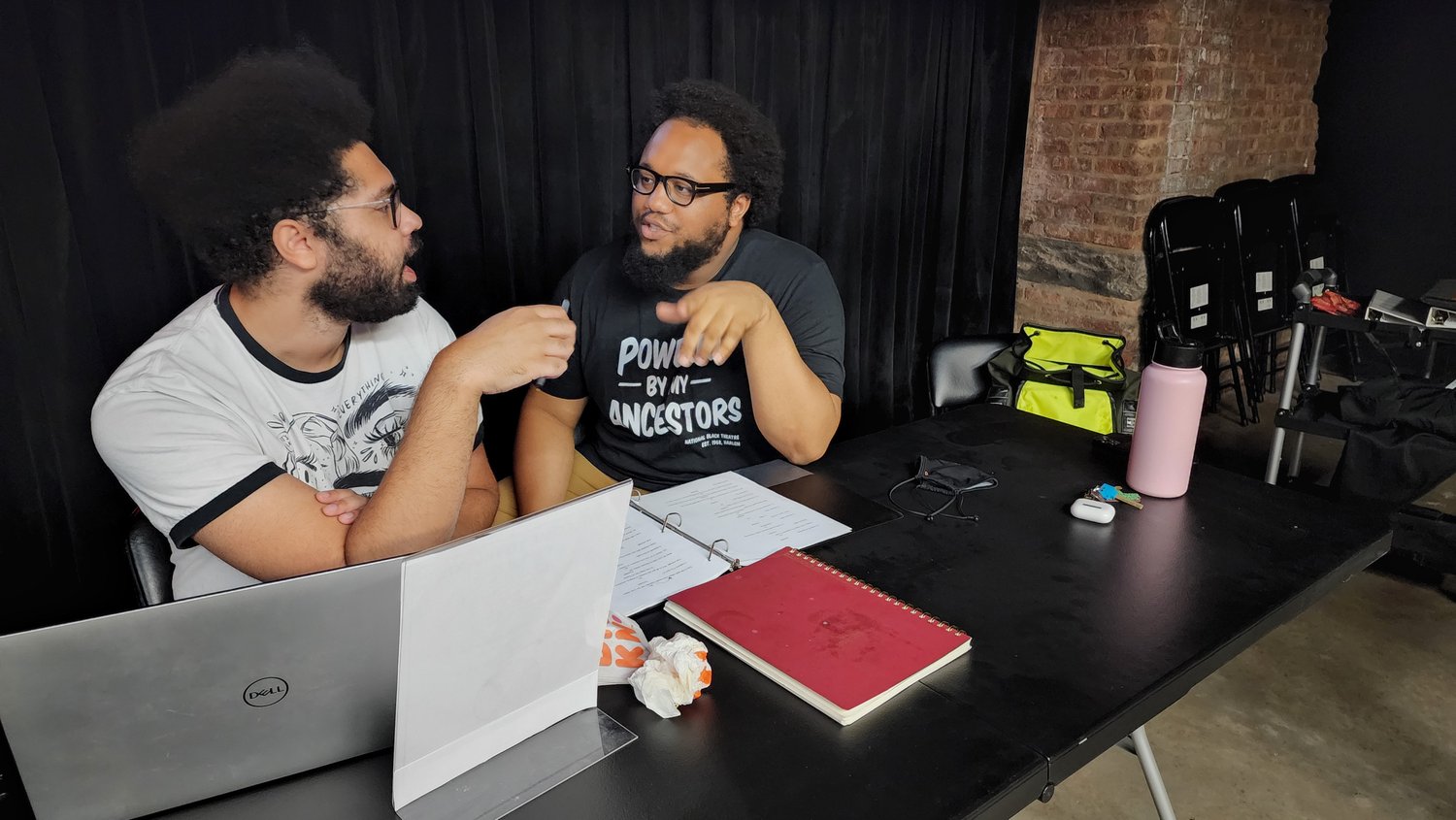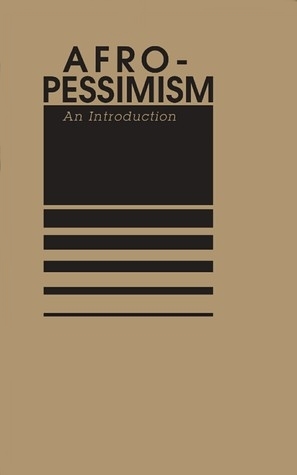The following transcript has been edited for clarity.
Zachariah: Hi, I’m Zachariah Ezer.
Dominique: Hey, I’m Dominique Rider.
Zachariah: And we’re just going to talk for a while.
Dominique: Yeah. So Zach, why don’t you talk a little bit about what we do together?
Zachariah: Yeah. I think that the project that you and I [have] been engaged in for, I guess, a number of years now… What is it, since 2018?
Dominique: That’s right.
Zachariah: We’re interested in aestheticizing philosophical systems into drama, into interesting drama hopefully. And the philosophy and system of thought that we spend the most time with is Afropessimism. Afropessimism, for people that don’t know, in a nutshell, is essentially the notion that slavery is a world-making force. It is something that constructed the world that we all live in, and it is still very much present–even if not sort of juridically–in a sort of libidinal way, in the psyche and in the world building and in the relationships that we all have with each other, especially with Black people. And so, we try to turn that into drama. There are many facets of [this] philosophy. We have a number of conversations about each one; we pick one; and we make a play out of it. And so, that’s something we’ve done a little bit here with The Single Raindrop. So that’s what, I guess, a part of the thing that I do, and then you do a thing once where, especially… I mean, you dramaturgically work with me on all the plays. But then once we get into rehearsal, you’re doing a little more of the praxis. So maybe you could talk about Jaye Austin Williams a little bit.
Dominique: Yeah. Jaye Austin Williams is a director and theorist who works a lot in trying to figure out how to take Afropessimism out of the realm of thought and put it more into practice. And so, a lot of the writings she does this incredible conversation with Frank B. Wilderson, the one of the co-creators of Afropessimism, called Staging Within Violence that tries to help students and directors—specifically theater directors in particular—situate themselves within the ontological violence that we experience. But then figuring out how to talk about that ontological violence within the context of a play, be it how to ratchet up the understanding of the violence taking place in the play, like if you’re working on a play that maybe is more Marxist in nature, but is not able to consider the vantage point in viewpoint of Black people. Or in figuring out ways to make Afropessimistic theater more specifically and more concretely, or using existing Black texts, learning how to read them against themselves and push them to be a little bit more Afro-pessimistic in nature. So, I’m always thinking about those [sorts] of things when Zach and I are collaborating and figuring out how to, essentially, indoctrinate a room as quickly as possible (because rehearsal processes are never that long) into the theory and ideology so that we can… We all have an agreed place to move from and to move within while we’re in the rehearsal room.
Zachariah: Great. You want to talk about what that literally looks like for a second? Then, I’ll talk about some of the history of our experiments the past couple of years.
Dominique: What does it literally look like? It’s been so long. I mean, I feel like it literally looks like thinking about care [first] and foremost. Right? And so… But then I think, more practically, it looks like sitting down around the table for maybe a little bit longer than some other folks and trying to walk through the steps of what Afropessimism is and trying to understand the way that… Which part, which tenet—because usually you’re working in terms of tenets, right?— which tenet of Afropessimism we’re dealing with on which play, on which show. And then being like, “This is the particular thing we’re honing in on here. Here is how it informs the world that Zach has made. Here is how it informs the characters.”
“Afropessimism… is essentially the notion that slavery is a world-making force.”
Zachariah: Yeah. And one thing I always like about the thing that you’re doing… Because what usually happens is actors come and talk to you, and to a lesser extent me, all the time about this being the first time they’ve—especially Black actors—experienced something like this in a room. Something I always thought about what you’re doing is… We’re not just radicalizing an audience when we make—
Dominique: We’re radicalizing actors.
Zachariah: Yeah, exactly. And they can take these tools and lessons into other rooms where they have experienced anti-Blackness and will experience [it] in the future.
Dominique: Right. And so they’re able to hopefully name and articulate a thing, even if only for themselves. So they know that they’re not out of their minds. Right? To be able to say, “Oh, this the thing I learned working with Zach and Dominique is a thing that is happening to me in this moment. How do I address it and how do I either work through it or make note that it is happening and ensure that hopefully it won’t happen again?”
Zachariah: Yeah, great. And then, I’m just gonna take a brief history of the experiments, at least as we’ve been explicitly engaged to do them. We started with Hi-ARTS where they gave us 50 hours to work on this play of mine called An Unclear World. And, we got to use that to spend most of… all of the time, a 29 hour reading essentially doing radicalization work and the stuff we’re talking about. Then after that, we went to Texas. We did another play of mine, Address the Body!.And, we worked with some kids. And, Allen. But, one thing [that] was good about working with kids is, I feel like when we do this a lot of times with adults, it’s their 50th, 100th, 200th room. But with those kids, right, it’s one of their first five rooms usually.
Dominique: Exactly.
Zachariah: And so, it’s able to be a lot more foundational in their minds, and something… You know, 20% of all the rooms they’ve been in have been Afro-pessimist rooms at this point. So, I think that’s something great about it. And then, we did Playwrights Horizons a few months after that. We worked on a play that actually wasn’t Afro-pessimistic explicitly, though all of our work is, and it was a chance to sort of stretch our theoretical adaptation work and [see] if that kind of stuff is able to happen when we’re not essentially working with our pet philosophy. And it was good! Also, I mean… because I don’t think it would have been possible without the grant. Yeah.
Dominique: I got a phone call from Natasha Sinha at Playwrights Horizons asking if I wanted to apply for this grant from NYSCA for a $10,000 commission and what I might want to work on. Zach and I had been talking about The Freedom Industry since 2021? Is [that] when you wrote it? 2020?
Zachariah: I wrote it in 2020, and we worked on in it the first time in 2021.
Dominique: Yeah. So we’ve been talking about it since 2020, and it never felt like we got the chance to really do it the way we wanted to. And so it was just a great culmination of… of all of those things coming together at Playwrights, which is really fun. And because of the commission, we got to do a 29 hour reading, but then also got to do something we’d never done quite in that way before. We were just able to talk to actors, not quite about the play, but about the—
Zachariah: The ideology.
Dominique: The ideology of the play and just seeing how much people knew, what they were interested in, and really just talking to actors about acting. Which is a lot of fun.
Zachariah: Yeah. And, I think that the notion of, I guess, talking to actors in this way or engaging people about, sort of, the topic of the play is something that we like doing and feels like it rhymes at least with some of the things that Civilians do. Yeah.
“We’re radicalizing actors.”
Dominique: Yeah, that feels right.
Zachariah: Yeah. Where I feel like the interest in topic, in subject matter, in and of itself, not just as fuel for drama, it feels…
Dominique: Right. [It] is work that… It’s… They are things that stand outside of the play and are oftentimes quite incidental to the play. The play-making is one thing. The events are another thing. And being able to hold, “These are actual things that happen or things that are happening. And this is the play.” And those two things can be in conversation with each other, [which] is always really exciting.
Zachariah: Yeah, I think so too. I mean, you know, we’re about eight minutes in. So… the play.
Dominique: Yeah, The Single Raindrop.
Zachariah: Yeah.
Dominique: So, what do you want to do first?
Zachariah: I guess I’ll just talk about what happened—how I thought of it. What I was thinking about. I was thinking about two things. One is, of course, the idea of flooded [towns], or as I call them in the play and in my regular life, “drowned towns” because I do think that a flood is a thing that can naturally happen. But, drownings are on purpose. Something I’m talking about in the play is the notion that a lot of man made bodies of water throughout the United States are actually places that were once thriving Black towns. And they were… Rivers and lakes were diverted to flood those places and drown the towns, in order… so that a white town nearby would be able to have access to fresh water whenever they wanted. And so, I think the most famous of these is Lake Lanier in Georgia, but actually this is happening on both sides of the Mason-Dixon in the early 20th century and before that as well. But, some of these were happening as late as, like, the late 40s, like right after World War II. And The Single Raindrop is geographically most based on the town of Neversink, New York. Crazy name.
Dominique: Absolutely.
Zachariah: And so, that’s sort of the “drowned town” half of it. The other half is VR and the elderly. I was talking with a mutual friend of ours, Lee Kravchenko, who is a researcher at Northeastern University, who does a lot of work with VR and the elderly and specifically about how it stimulates the part of the brain— the hippocampus—that is degraded in diseases like dementia, Alzheimer’s, that kind of thing. And about how it’s able to preserve that part of the mind a little longer. Studies are starting to show that. And, about how: wouldn’t it be nice if senior centers had VR? And, I think that the play was a sort of a combination of those two things, like what if the thing that was being preserved is this sort of traumatic, conscious, and subconscious memory of a town drowning?
And so, it’s about the last living survivor of a drowned town who, after the Black town was drowned, was still a kid and was forced to live in the white town for the rest of his life. So that’s what the play is basically about. [Zachariah searches for his next words.]
I was reading something really great recently that was talking about [how] the only way to acknowledge that the past was evil is to say that the evil has passed. It’s Wilderson who’s quoting someone else saying that. It’s specifically talking about [how] the place of the slave is to have a forgiveness that must always be given. It can never be revoked.
Dominique: Not us reading the same thing!
Zachariah: Oh, word!
Dominique: On Twitter?
Zachariah: Yeah. ‘Cause it’s about the woman who meets the man who enslaved her. Whose ancestors enslaved her… Yeah. It is always the job of the slave, the Black person, to forgive. It is part of the script of modern life: “The only way we’re able to acknowledge that the thing has happened is if forgiveness is given so we can move past it.” The thing I was thinking about is [what] refusal of that looks like.
Dominique: Because it also just assumes everything has finished.

Zachariah: Exactly.
Dominique: It assumes that the event of slavery is over and not an ongoing thing that we are living through.
Zachariah: Exactly. And so, I think I was thinking a lot of… And so, a thing I’m thinking a lot about is that the protagonist of the play—Harry, the survivor—is somebody who’s not over it. And, he has dementia, but when he is able to be lucid, he is experiencing the trauma of this thing very viscerally. And that is a thing that is uncomfortable to the non-Black people around him, especially as they understand more and more the thing that he is distraught about. I wanted to explore that.
And then also, a thing I think is important to me about this is that anti-Blackness is the [thing] that we all (Black people) experience to one degree or another. But the acknowledgment, the awareness, the engagement with it is on a spectrum, for sure. And how much… and I think the more you engage the Afropessimism, the more you’re not only engaging with the struggle in an intellectual way, but doing a kind of forensic accounting of all of the things in the world (and in your life) that have been touched by anti-Blackness. And so, the sort of transfer of that living awareness from Harry to the character of Arathka, as we get to the end of the play, who takes up Harry’s crusade for the knowledge of the drowned town… is something that I was thinking a lot about in terms of the way that we work in Afropessimism. So. Yeah, that’s kind of what I’ve been thinking about. The other thing I think about, because I’m very… I like the VR stuff. I think it’s interesting what we’ve been doing. There’s a trio of interludes that are retellings of various myths in VR. And I’m hoping, you know, fingers crossed that someday we’ll be able to actively… When an audience experiences those, it will be through the medium of VR.
Dominique: Yeah. Which is really exciting.
Zachariah: How about you? When you got this play, a couple of hours before we read it out loud, I don’t know if [you had] thoughts as they pertain to how we work and what maybe is interesting to you about doing the reading? But also, if we were to get it on its feet properly.
Dominique: Yeah, I mean…. You know, Saidiya Hartman has this quote.
Zachariah: All right.
Dominique: Saidiya Hartman says, “Can you talk about the violence of a lynching without re-traumatizing the listener?” And I think about that a lot as it relates especially to theater, right? Can we talk about violence and horror without re… without enacting that trauma on other people? And I think that was a thing I thought was really interesting about it, was the way that memory becomes the vehicle for violence. That there is one character in this play who is always talking about this thing, but because of Harry’s dementia, everyone is just like, “It’s nonsense.” Which is the way that in real life people react to like anti-Blackness, right? It becomes a conspiracy.

That sort of play with memory, that sort of play with… even just the layers of reveal of who has actually been making it impossible for this Black town to be only recognized. That’s the only thing they’re asking for, right, is recognition. What really interested me, interested me in both character ways and then also in terms of just thinking about intimate relationships… Sometimes, the people who don’t understand the… Being in intimate relationships with non-Black people can be really hard for that… for those… for the reasons the play is interested and invested in, right? And then I think: I don’t know how to do the VR! I’m really curious about that. I love to get into the reality of just giving somebody some VR glasses and be like, “Put them hoes on, right now! Oh, wait, you’re in the VR world, then you’re back,” right? So I think there’s something really curious about the interplay between text–live text–and VR to see what that can be and the incorporation of technology. When I was in college, I read Towards a Cyborg Theater. I think [that’s] what the book is called.
Zachariah: Oh yeah. Yeah, yeah, yeah, yeah.
Dominique: Which was really informative to me. And thinking about the way that a mic is an augmentation. Right? But, what does it mean to fully create an augmentation on stage? What does that do to like the viewer, to the thing you’re watching? And that is really curious to me.
Zachariah: Yeah. Not to get too technical about it, but I guess the way I had imagined it is… You ever heard of Google Cardboard?
Dominique: Yeah.
Zachariah: Yeah, yeah. The idea where, like, your phone becomes the headset and you put it in there. And maybe you have, like, some spare phones for, like, you know, people who either won’t or can’t, download or whatever.
Dominique: Or don’t have phones.
Zachariah: Or don’t have phones. And so that being the way that, you know… and I’ve said this to you a bunch of times, but I… the way I’m thinking about it is like… you know [how] before movies were fully 3D and they would have three sequences, and it’d be like, “put on your 3D glasses”? A more artful and subtle way, but that’s sort of the form. So yeah, that’s the kind of thing I’m thinking about.
So, we’re going to do a reading coming up.
Dominique: That’ll be lit. I’m sure
Zachariah: Yeah. I’m looking forward to it. I guess… we don’t… We have… not a ton of time. So I’m curious what kind of things you’re going to be focusing on as we get into it.
Dominique: I guess… really just the text. I’m really curious about the two co… the two big relationships in it. The relationship between Harry and…
Zachariah: Oh, Patty.
Dominique: Patty. And then Sam and… (Sam?)
Zachariah: Yes, Sam. Ari.
Dominique: Ari. And just the way those two relationships sort of both come to an end in, like, two very different ways. And just… Yeah, I’m curious to see what you… what the next draft is like of it.
Zachariah: Yeah. I think the thing I’m thinking about is really giving the ending a little more room to breathe, but I am feeling like, yeah, the place we end is the place that I want to end and that… Yeah, [and] a sub-theme of this, I guess, is that if you have any white friends, maybe take another look at them.
Dominique: Yes.
Zachariah: But it is a thing where… Yeah, I think that’s a thing I’m really interested in engaging with in the play. And actually, the last moment is something that I’m excited to do. And I think that, I mean, unless you have anything more you want to say, that’s where I’ll talk a little about [the end] and we’ll call it a day.
Dominique: Yeah.
Zachariah: I think that the last moment in the play is when Jenny, who is the care nurse for the senior home where most of the play takes place, after all the events of the play comes to Sam and Ari’s, who are VR designers, workshop, and then puts on the headset, so that she can do the VR experience that everyone has been doing the entire time. And the last thing I say in the play is that you can stay in the VR world as long as you want, and I think this idea of being able to exist in this augmented version of history, and that being a thing that you discover for yourself is [what] really attracted me to the combination of VR and theater. Right?
I like that theater is a time based medium that happens at the… We all experience the same thing at the same time, but I think leaving everyone in sort of an aporia where they can wander around and really experience sort of the weight of, you know, drowned towns for themselves at the pace that feels like what they’re able to handle feels important to me. And so, if I can leave anyone with that, since we can’t do the VR in the reading, being able to leave everyone with that idea feels important.
Extended Play is a project of The Civilians. To learn more about The Civilians and to access exclusive discounts to shows, visit us and join our email list at TheCivilians.org.










